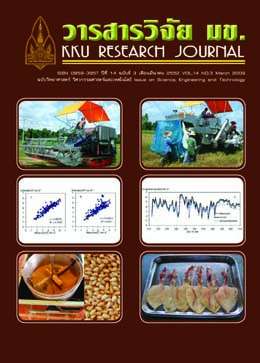The effect of pure ethanol as a fuel on exhaust emissions in spark ignition engines (Thai)
Main Article Content
Abstract
Nowadays high price and shortage of fuel are serious problems and require solving immediately Alternative fuels which are abundant and easy to produce are the key to solving these problems. Ethanol is an interesting solution because it is mostly obtained from the fermentation of cassava, corn, sugar cane etc. These plants can be cultivated in all parts of Thailand. Moreover, ethanol has higher octane value than gasoline so it can increase the compression ratio of spark ignition engines with high performance. A single cylinder, 124.8 cc, four stroke and electrical injection engine controlled by an electronic system with spark ignition was used in this study to determine the effect of pure ethanol (99.5%) and gasoline fuels on carbon monoxide (CO), hydrocarbon (HC) and nitric oxide (NO) emissions at 3000-6000 rpm engine speed without load and with constant load. Modification of air fuel ratio was needed to adjust the engine for ethanol purposes. Comparing with gasoline, it was found that using ethanol at no load reduced CO, HC and NO emissions 90.59%, 41.46% and 67.68%, respectively; while, at constant load it reduced CO, HC and NO emissions 84.62%, 43.35% and 81.56% from their maximum values, respectively.


